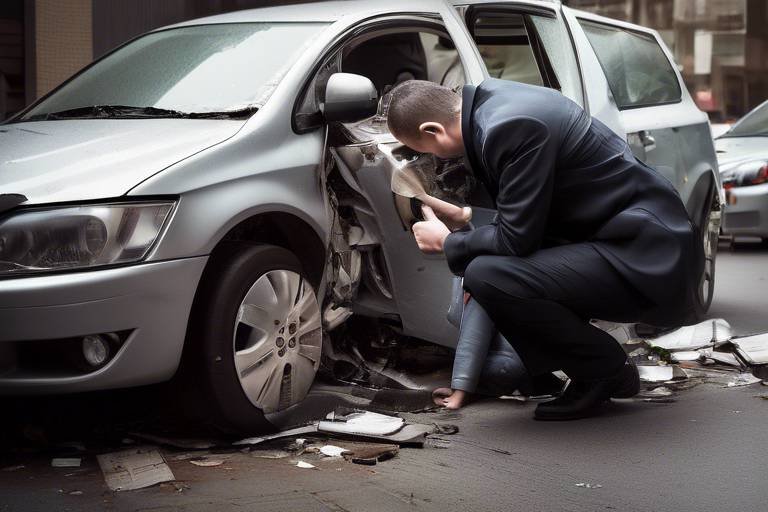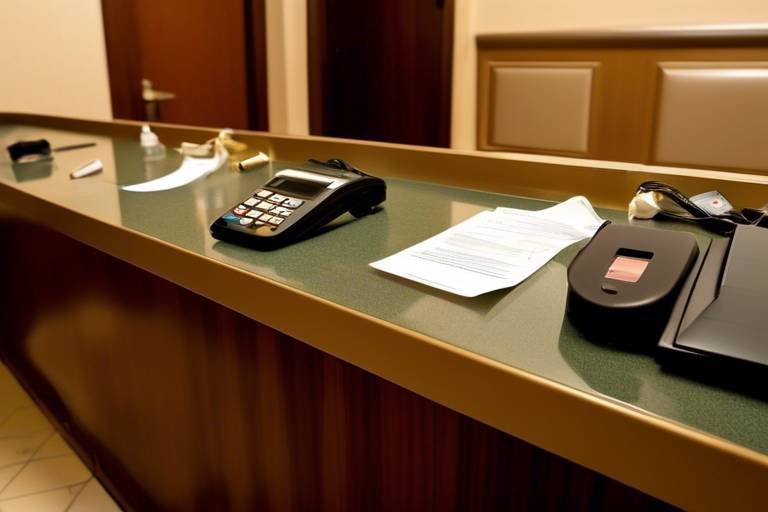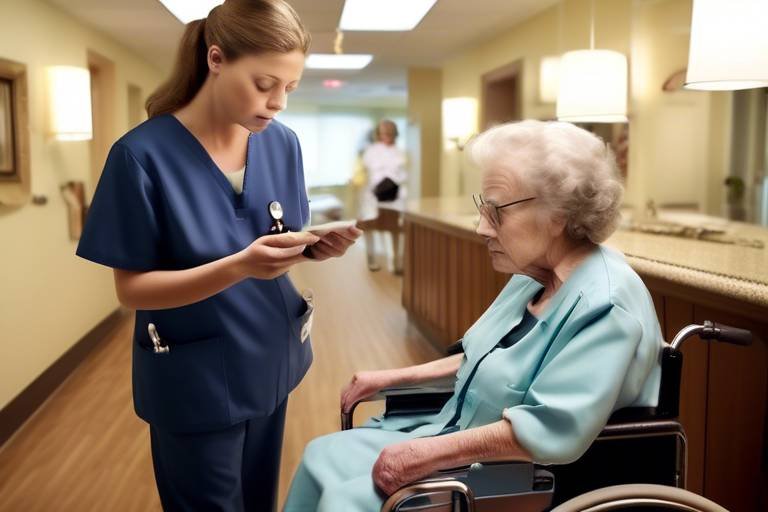Safety Tips for Witnesses of Crimes
Witnessing a crime can be a shocking and unsettling experience. It’s crucial to prioritize your personal safety while also considering how to assist law enforcement effectively. In this article, we will explore essential safety tips for witnesses, focusing on your responsibilities and the best practices to follow in such situations. By understanding your role and taking appropriate actions, you can make a difference without putting yourself at risk.
Witnesses play a crucial role in the criminal justice system. Your observations can help law enforcement piece together the puzzle of what happened. It’s not just about seeing something; it’s about knowing how to react. When you understand what is expected of you, it can boost your confidence and preparedness. Think of yourself as a key player in a team; your insights could lead to justice being served. So, let’s dive into the immediate actions you should take when you find yourself in such a tense situation.
When witnessing a crime, your immediate reactions can greatly influence the situation. The first step is to ensure your safety and the safety of those around you. This isn’t just about being a bystander; it’s about being an informed participant in a potentially dangerous scenario. Here are some crucial steps to consider:
Before taking any action, it’s essential to assess the situation carefully. Understanding your environment and potential dangers can help you decide the best course of action. Are there any threats nearby? Is the situation escalating? Take a moment to observe and analyze before jumping into action. This is similar to being a firefighter who first evaluates the fire before deciding the best way to extinguish it.
Knowing your surroundings and identifying possible escape routes can be vital in ensuring your safety. Quickly evaluate your environment for safe exits. Ask yourself questions like:
- Where is the nearest exit?
- Are there any obstacles in my way?
- Can I get to safety without drawing attention to myself?
Being aware of your escape routes can make all the difference in a crisis.
Remaining calm during a crisis is crucial. Panic can cloud your judgment and lead to poor decisions. Techniques for maintaining composure include taking deep breaths, counting to ten, or even focusing on a specific object in your surroundings. Think of it as finding your center in a storm; it helps you think clearly and respond appropriately to the situation.
Accurate documentation of what you witnessed can aid law enforcement significantly. This includes noting down the time, location, and any relevant details about the crime and the individuals involved. It's essential to record these details without compromising your safety. Use your phone discreetly if possible, or write things down in a notebook if it feels safer. Remember, your observations are valuable pieces of evidence.
Reporting a crime is a critical step after witnessing it. It’s not just about telling someone what happened; it’s about ensuring that the information is conveyed effectively to help those in authority take action. Here’s how to do it right.
Timing can be essential when reporting a crime. You want to approach law enforcement when it is safe to do so. If the situation is still unfolding, it might be wise to stay hidden and wait for the right moment. Think of it like a game of chess; you need to anticipate your moves carefully. Make sure you’re not putting yourself in harm's way while trying to do the right thing.
Clear and precise information can make a significant difference in investigations. When you report, focus on the following details:
- What exactly did you see?
- Who was involved?
- What time did it happen?
- Where did it take place?
Sharing these specifics can help authorities follow up effectively and ensure justice is served.
Q: What should I do if I feel unsafe while witnessing a crime?
A: Your safety comes first. If you feel threatened, find a safe place and avoid confrontation. You can report the crime anonymously if needed.
Q: Can I be forced to testify if I witness a crime?
A: Yes, in many jurisdictions, witnesses may be required to testify in court. However, there are protections in place to ensure your safety.
Q: How can I report a crime anonymously?
A: Many police departments have anonymous tip lines. You can also use online platforms that allow for confidential reporting.
Q: What if I forgot some details about the incident?
A: It’s okay! Share what you remember, and law enforcement can work with that information. Every detail helps.

Understanding Your Role as a Witness
Witnesses play a crucial role in the criminal justice system, acting as the eyes and ears that can help bring justice to light. Imagine being in a movie where the hero needs the right information to save the day; that's you! When you witness a crime, you hold pieces of a puzzle that law enforcement desperately needs to solve the case. But what exactly is expected of you? Understanding your role not only empowers you but also enhances the overall effectiveness of the justice process.
First and foremost, it’s essential to realize that your safety is paramount. While you may feel compelled to intervene or help, your first instinct should be to ensure that you are out of harm's way. Think of yourself as the captain of a ship; your first duty is to keep the ship afloat before you can rescue anyone else aboard. Assessing the situation and understanding your environment is key. This means taking a moment to observe what’s happening, identifying any potential threats, and determining whether it’s safe to stay or if you should seek safety.
Once you’ve ensured your safety, your next role is to gather information. This doesn’t mean you should rush in with a notepad and start taking notes; rather, you should mentally document the details of what you see. Ask yourself questions like: Who was involved?, What exactly happened?, When and where did it take place?, and Are there any identifiable features of the suspects? These details can be invaluable when you report the crime later. It’s like being a detective in your own right, piecing together the narrative that can aid law enforcement.
Moreover, it’s vital to remember that every witness is different. Some may feel comfortable stepping in to help, while others may prefer to observe from a distance. There’s no right or wrong way to react, as long as you prioritize your safety and the safety of others. If you choose to intervene, do so with caution and consider the potential consequences. You wouldn’t jump into a raging river without assessing the current first, right? The same principle applies here.
In summary, understanding your role as a witness involves a combination of safeguarding yourself, gathering important information, and knowing when to act or when to stay back. Each of these elements is vital to contributing effectively to the investigation process. By being aware of your surroundings and taking a moment to think before you act, you can make a significant difference in the outcome of a situation. So, the next time you find yourself in such a scenario, remember: you are not just a bystander; you are a critical part of the community’s safety net.

Immediate Actions to Take
When you find yourself in the unfortunate position of witnessing a crime, your immediate reactions can significantly impact not only your safety but also the safety of those around you. The first instinct might be to intervene, but it's crucial to remember that your primary responsibility is to ensure your own safety. Instead of rushing into the fray, take a moment to assess the situation. This means looking at the environment, identifying any potential threats, and determining whether it’s safe to act or if it’s better to stay back. Think of it like being a deer in the headlights; you need to evaluate your surroundings before making a move.
One of the first things you should do is to identify escape routes. Knowing how to get out of a dangerous situation can be a lifesaver. Scan your surroundings for exits, whether they are doors, windows, or even alleys. This mental map of your environment will not only help you escape if necessary but also keep you grounded and aware of your surroundings. Imagine you're playing a video game where you have to navigate through a maze; knowing where to go can make all the difference.
Staying calm and focused is another essential action to take. It’s easier said than done, right? But maintaining your composure can help you think clearly and react appropriately. Techniques like deep breathing or counting to ten can help you regain your focus. Picture yourself as a lighthouse in a storm; your calmness can guide not only you but also others who might be panicking. Remember, your ability to stay collected can greatly influence the outcome of the situation.
As you take these immediate actions, it’s also important to document the incident as accurately as possible. This doesn’t mean you should put yourself in harm's way, but try to remember key details like the time, location, and descriptions of the individuals involved. Think of this as creating a mental snapshot of the event. If you're able to, jot down notes on your phone or a piece of paper once you're in a safe location. This documentation can be invaluable for law enforcement later on.
In summary, when witnessing a crime, your immediate actions—assessing the situation, identifying escape routes, staying calm, and documenting the incident—are crucial steps that can help ensure your safety and assist law enforcement. Always prioritize your well-being over intervening directly in the situation.
Q: What should I do if I feel unsafe while witnessing a crime?
A: If you feel unsafe, your first priority should be to remove yourself from the situation. Find a safe location and call the authorities to report the incident.
Q: Is it necessary to intervene if I witness a crime?
A: It’s generally not recommended to intervene directly. Instead, focus on ensuring your own safety and providing accurate information to law enforcement.
Q: How do I remember details of the incident?
A: Try to focus on key details such as the time, location, descriptions of the people involved, and any vehicles present. If possible, take notes once you’re in a safe place.
Q: Can I remain anonymous when reporting a crime?
A: Yes, many law enforcement agencies allow you to report crimes anonymously. Check with your local authorities for specific guidelines.

Assessing the Situation
When you find yourself in a situation where a crime is unfolding before your eyes, the first instinct may be to jump in and help. However, it’s essential to take a moment and assess the situation before doing anything rash. This is not just about your safety; it's about ensuring that you can provide the most accurate information to law enforcement later on. Think of it like being a detective in a movie—your observations can turn the tide of the investigation!
Start by taking a deep breath and scanning your surroundings. Ask yourself a few key questions: What exactly is happening? Are there any immediate threats to your safety or the safety of others? Is there a potential for escalation? By understanding the environment, you can make informed decisions. Take note of:
- The nature of the crime: Is it a robbery, an assault, or something else? The type of crime can dictate how you should react.
- The number of people involved: Are there multiple perpetrators or just one? Are there bystanders who could be at risk?
- Your own location: Are you in a position to help safely, or is it better to stay back?
Next, consider the potential dangers. If you see someone brandishing a weapon, your best option might be to retreat and call the authorities rather than intervene. Remember, being a hero can sometimes mean knowing when to step back. Your safety is paramount, and if you’re in danger, you won’t be able to help anyone.
Moreover, look for any possible escape routes. Just like in a fire drill, knowing how to exit the situation safely can save your life. Identify the nearest exits, whether they are doors, windows, or other openings. If you need to leave quickly, having a plan can make all the difference. Your awareness of the environment can be your best ally in a crisis.
Finally, staying calm and focused is crucial. Panic can cloud your judgment and lead to poor decision-making. Try to maintain a clear mind; this will not only help you assess the situation better but also allow you to remember important details that could be useful later. Techniques such as deep breathing or counting can help you regain control over your emotions.
In summary, assessing the situation involves a combination of awareness, critical thinking, and emotional stability. By taking a moment to evaluate what’s happening, you can protect yourself and potentially assist law enforcement in a meaningful way. Remember, your observations could be the key to solving the crime!
Q: What should I do if I feel unsafe while witnessing a crime?
A: If you feel unsafe, prioritize your safety above all else. Move to a secure location and call the authorities to report the incident.
Q: Is it okay to intervene during a crime?
A: Intervening can be dangerous. Assess the situation first and consider whether your involvement could escalate the situation. Sometimes, the best action is to report what you see.
Q: What details should I remember to report to the police?
A: Focus on the who, what, when, where, and how. Details like descriptions of individuals, the type of crime, and any weapons involved are crucial for law enforcement.
Q: How can I help law enforcement without putting myself at risk?
A: You can help by providing clear and accurate information once you are in a safe location. Avoid putting yourself in harm's way by trying to intervene directly.

Identifying Escape Routes
This article provides essential safety tips for individuals who witness a crime, emphasizing the importance of personal safety, reporting procedures, and how to assist law enforcement without putting oneself at risk.
Witnesses play a crucial role in the criminal justice system. Knowing what is expected can help you feel more prepared and confident in your actions during and after witnessing a crime.
When witnessing a crime, your immediate reactions can greatly influence the situation. This section outlines the crucial steps to take for your safety and the safety of others around you.
Before taking any action, it's essential to assess the situation carefully. Understanding the environment and potential dangers can help you decide the best course of action.
Knowing your surroundings and identifying possible escape routes can be vital in ensuring your safety during a crime. Imagine being in a crowded area, and suddenly chaos erupts; your first instinct should be to look for an exit. Why is this so important? Because in a moment of panic, having a clear plan can save your life.
Start by taking a mental snapshot of your environment. Look for:
- Doors: Are there any exits nearby? Make a note of how far they are and how to reach them quickly.
- Windows: In some situations, a window may be your best option, especially if you are on the ground floor.
- Landmarks: Identify nearby buildings or features that can guide you to safety.
Once you've identified potential escape routes, it’s crucial to stay aware of your surroundings. Situations can change rapidly, and what seemed like a safe exit may become dangerous. Always be prepared to adapt your plan. Think of it like being in a maze; the more paths you know, the better your chances of finding your way out.
Also, consider the people around you. If it's safe, help others who may be panicking or unsure of what to do. Remember, your safety is paramount, but being a good Samaritan can also make a significant difference in someone else's life during a crisis.
Accurate documentation of what you witnessed can aid law enforcement significantly. This section explains how to effectively record details without compromising your safety.
Reporting a crime is a critical step after witnessing it. This section provides guidance on how to effectively communicate what you saw to the authorities.
Timing can be essential when reporting a crime. This part discusses when and how to approach law enforcement to ensure your safety and the integrity of the information.
Clear and precise information can make a difference in investigations. This section highlights what details are most important to share with authorities for effective follow-up.
Q: What should I do if I feel unsafe while witnessing a crime?
A: Your safety is the top priority. If you feel threatened, prioritize finding a safe location over intervening.
Q: Is it necessary to confront the criminal?
A: No, confronting a criminal can be dangerous. Instead, focus on observing details that can help law enforcement.
Q: How can I remember important details after the incident?
A: If safe, jot down notes immediately after the event, or use your phone to record your observations discreetly.

Staying Calm and Focused
In the midst of chaos, can feel like an uphill battle. However, it's one of the most critical things you can do when witnessing a crime. Imagine yourself as a lighthouse in a storm; your ability to remain steady can not only guide you but also help those around you. When adrenaline kicks in, it’s easy to let panic take over, but that’s when your mental clarity is needed the most.
First and foremost, take a deep breath. Yes, it sounds simple, but deep breathing can significantly lower your heart rate and help you regain control of your thoughts. Inhale deeply through your nose, hold for a moment, and exhale slowly through your mouth. Repeat this a few times, and you’ll find that your mind starts to clear. This technique can be likened to a reset button for your brain, allowing you to think more rationally about your next steps.
Next, try to focus on the present moment. It’s easy to get lost in a whirlwind of “what ifs” or “should haves.” Instead, concentrate on what’s happening right now. Ask yourself questions like, “What do I see?” or “What sounds do I hear?” This mindfulness technique can anchor you and prevent your mind from spiraling into panic. Being present helps you gather important details that could be crucial for law enforcement later.
While you’re in this heightened state of awareness, it’s also essential to keep your body language open. If you appear panicked or defensive, it may escalate the situation. Stand or sit up straight, keep your arms relaxed, and maintain eye contact with those around you. This not only conveys confidence but also helps to reassure others that you are in control.
In some cases, talking yourself through the situation can be beneficial. This is not about vocalizing your thoughts out loud, but rather having a mental dialogue. Remind yourself of the steps you need to take: “I need to assess the situation,” “I must find a safe exit,” or “I will document what I see.” By creating a mental checklist, you can systematically approach the chaos, making it feel more manageable.
Lastly, do not hesitate to seek help if you feel overwhelmed. Whether it’s a friend nearby or a bystander, having someone to share the burden can make a world of difference. Think of it as having a buddy system; two heads are better than one, especially in a tense situation. Remember, your safety is paramount, and reaching out for support is a sign of strength, not weakness.
In summary, during a crime can significantly impact not only your safety but also the effectiveness of the response from law enforcement. By employing techniques such as deep breathing, mindfulness, maintaining open body language, and seeking support, you can navigate through the chaos with clarity and purpose.
- What should I do first if I witness a crime?
Assess the situation carefully and ensure your safety before taking any action. - How can I document what I see without putting myself in danger?
Use your phone discreetly to take notes or record videos if it feels safe to do so. - Is it okay to intervene during a crime?
Only intervene if you can do so safely; otherwise, prioritize your safety and report the crime. - How can I help law enforcement after witnessing a crime?
Provide clear and accurate information about what you saw, including descriptions of suspects and events.

Documenting the Incident
This article provides essential safety tips for individuals who witness a crime, emphasizing the importance of personal safety, reporting procedures, and how to assist law enforcement without putting oneself at risk.
Witnesses play a crucial role in the criminal justice system. Knowing what is expected can help you feel more prepared and confident in your actions during and after witnessing a crime.
When witnessing a crime, your immediate reactions can greatly influence the situation. This section outlines the crucial steps to take for your safety and the safety of others around you.
Before taking any action, it's essential to assess the situation carefully. Understanding the environment and potential dangers can help you decide the best course of action.
Knowing your surroundings and identifying possible escape routes can be vital in ensuring your safety. This section discusses how to quickly evaluate your environment for safe exits.
Remaining calm during a crisis is crucial. This part covers techniques for maintaining composure, which can help you think clearly and respond appropriately to the situation.
Accurate documentation of what you witnessed can aid law enforcement significantly. When you find yourself in a situation where a crime is unfolding, your ability to record details can be the difference between a successful investigation and a missed opportunity. Start by observing carefully. What do you see? What do you hear? Pay attention to the small details that might seem insignificant at first glance but could prove vital later. For instance, the color of a car, the clothing of a suspect, or even the time of day can all be crucial pieces of information.
While documenting, use your phone or a notepad if it's safe to do so. If you are using your phone, consider taking a few quick photos or recording a video, but only if it doesn’t put you in harm’s way. Remember, your safety comes first! If you feel threatened, it’s better to retreat to a safe location and call the authorities rather than risk your safety for documentation.
Here are some key points to consider when documenting:
- Time and Date: Note the exact time and date of the incident.
- Location: Be specific about where the event took place.
- Descriptions: Write down detailed descriptions of people involved, including height, build, clothing, and any distinguishing features.
- Witnesses: If there are other witnesses, make a note of their presence and any contact information.
- Sequence of Events: Try to recall the order of events as accurately as possible.
After you have documented the incident, it’s crucial to store this information securely until you can relay it to law enforcement. This information could be the key to solving a crime, and your attention to detail could make a significant difference in the outcome.
Reporting a crime is a critical step after witnessing it. This section provides guidance on how to effectively communicate what you saw to the authorities.
Timing can be essential when reporting a crime. This part discusses when and how to approach law enforcement to ensure your safety and the integrity of the information.
Clear and precise information can make a difference in investigations. This section highlights what details are most important to share with authorities for effective follow-up.
Q: What should I do if I feel unsafe while witnessing a crime?
A: Your safety is the top priority. If you feel threatened, find a safe location and call the authorities instead of intervening directly.
Q: Can I be forced to testify if I witness a crime?
A: In many jurisdictions, witnesses can be required to testify, but you may have legal protections. It’s best to consult with a legal expert if you have concerns.
Q: How can I help law enforcement without putting myself at risk?
A: Document the incident from a safe distance, avoid confrontation, and provide accurate information to the authorities as soon as it’s safe to do so.

Reporting the Crime
Reporting a crime is not just a civic duty; it's a vital action that can lead to justice and the prevention of further incidents. When you witness a crime, your first instinct might be to run away or hide, but taking the right steps to report what you saw can make a significant difference. It’s important to remember that you are not alone in this process. Law enforcement agencies are trained to handle reports from witnesses, and they rely on the information you provide to piece together what happened. So, how do you go about it?
The first step is to find a safe space where you can make the report without feeling threatened. This could be a nearby shop, a public area, or even your car. Once you feel secure, you can either call the police or approach an officer directly if one is nearby. When you contact law enforcement, be prepared to explain the situation clearly and concisely. Think of it like telling a story—one that needs to be accurate and detailed. You might want to consider the following points:
- What did you see? Describe the incident in as much detail as possible.
- When did it happen? Provide the exact time or a rough estimate.
- Where did it occur? Give a specific location, including any landmarks.
- Who was involved? If you can, describe the suspects and any victims.
- Any additional information? Mention anything else that might be relevant, such as vehicle descriptions or the direction people fled.
Timing is crucial when reporting a crime. The sooner you report it, the fresher your memories will be, and the more useful your information will be to the authorities. If you wait too long, you might forget important details or the situation might change, making it harder for law enforcement to act. However, if you are in a dangerous situation, prioritize your safety first. Once you are safe, then focus on making that report.
Moreover, providing accurate information is paramount. Law enforcement relies heavily on the details you provide to conduct their investigations. Even small details can be crucial in solving a case. When you report a crime, be honest and straightforward. Avoid embellishing or guessing; if you’re unsure about something, it’s perfectly okay to say so. Remember, clarity is key!
In some cases, you might feel nervous about coming forward. You might worry about your safety or even about being called as a witness in court. Rest assured, there are laws in place designed to protect witnesses. If you have concerns, don't hesitate to discuss them with the police. They can provide you with information on witness protection programs and other resources to ensure your safety.
In conclusion, reporting a crime is a courageous act that can contribute to a safer community. Your role as a witness is invaluable, and the information you provide can help bring justice to those affected. So, the next time you witness a crime, remember to stay calm, assess the situation, and report it accurately. You have the power to make a difference!
Q: What should I do if I feel unsafe reporting a crime?
A: Your safety is the priority. If you feel threatened, find a safe location first. You can report the crime anonymously by calling a tip line or using online resources if available.
Q: Can I remain anonymous when reporting a crime?
A: Yes, many jurisdictions allow for anonymous reporting. Check with local law enforcement for options available in your area.
Q: What if I don’t remember all the details?
A: That’s okay! Provide as much information as you can and be honest about what you don’t remember. Every piece of information helps.
Q: Will I have to testify in court?
A: It depends on the case. If your testimony is necessary, law enforcement will inform you and provide guidance on what to expect.

Choosing the Right Time to Report
When you witness a crime, the timing of your report can be just as critical as the details you provide. You might be filled with adrenaline, your heart racing, and your mind buzzing with what just happened. But it's essential to take a moment to consider when and how to report the incident. Rushing in without a plan can not only jeopardize your safety but also affect the investigation.
First and foremost, ensure that the situation is safe for you to report. If the perpetrator is still nearby or if there is an immediate threat, your priority should be to find a safe location. You wouldn’t want to put yourself in harm’s way by approaching law enforcement while the danger is still present. After securing your safety, you can then think about how to best communicate what you witnessed.
Once you’re out of harm's way, consider the following factors to determine the right time to report:
- Immediate Threat Level: If the crime is ongoing or if you feel that someone else may be in danger, it’s crucial to contact authorities right away. Use your phone to dial emergency services without delay.
- Calmness: After the initial shock, take a moment to breathe. A calm mind will help you articulate your thoughts clearly when speaking to law enforcement.
- Location: If you’re in a crowded area, it may take longer for law enforcement to reach you. Find a quiet spot where you can safely provide information without distractions.
Next, think about the best method to report the crime. If you’re in a public space, you might find a police officer nearby. Approaching them directly can sometimes be the quickest way to get help. However, if you’re unsure or if it feels unsafe, calling the police is always a reliable option. Don’t forget to mention your location clearly so they can reach you without delay.
Moreover, the details you provide can significantly impact the investigation. If you wait too long to report, you might forget crucial aspects of the event. To avoid this, jot down notes as soon as you can, capturing everything you remember. This can include:
- The time and date of the incident
- Descriptions of the suspect(s)
- Any vehicles involved, including license plate numbers
- Witnesses who may have also seen the event
In summary, choosing the right time to report a crime involves a careful balance of ensuring your safety and providing timely, accurate information to law enforcement. Remember, your observations can help bring justice and prevent further incidents, but your personal safety must always come first. So take a deep breath, assess the situation, and make that call when it's safe to do so!
Q: What should I do if I feel unsafe reporting a crime?
A: Always prioritize your safety. If you feel threatened, find a secure location before reporting the crime.
Q: How can I remember details of the incident?
A: Jot down notes immediately after the event, focusing on key aspects like time, location, and descriptions of individuals involved.
Q: Is it necessary to report every crime I witness?
A: While it’s important to report serious crimes, consider the context. If it’s a minor issue, you might choose to inform local authorities or community services instead.

Providing Accurate Information
When you witness a crime, your ability to provide accurate and detailed information can significantly influence the outcome of an investigation. Think of yourself as a vital puzzle piece in a much larger picture; without your piece, the image remains incomplete. It's essential to remember that the details you share can help law enforcement piece together the events that transpired. So, how can you ensure that your information is both clear and effective?
First and foremost, focus on the who, what, when, where, and how of the incident. These fundamental elements serve as the backbone of any report. For instance:
- Who: Describe the individuals involved, including their physical characteristics, clothing, and any distinguishing features.
- What: Clearly explain what you observed. Was it a robbery, an assault, or something else?
- When: Provide the exact time or a rough estimate of when the crime occurred. Even a few minutes can make a difference.
- Where: Specify the location of the incident. If possible, include nearby landmarks to help law enforcement pinpoint the area.
- How: Describe the actions that took place. Did the suspect use a weapon? Were there any vehicles involved?
Additionally, try to remain as objective as possible. While it’s natural to have emotional reactions to witnessing a crime, your account should be based on what you saw, rather than how you felt about it. Avoid making assumptions or jumping to conclusions. Instead, stick to the facts and let law enforcement draw their conclusions.
Another crucial aspect of providing accurate information is timeliness. The sooner you report what you witnessed, the fresher your memory will be. If you wait too long, details may fade, and you might unintentionally alter your recollection of events. If you're unsure about something, it's better to mention that you are uncertain rather than guessing. This honesty can help investigators understand the reliability of your account.
Furthermore, if you have the opportunity, jot down notes immediately after the incident. This can serve as a valuable reference when you speak to authorities. You can create a simple table to organize your thoughts:
| Detail | Description |
|---|---|
| Who | [Description of individuals involved] |
| What | [Description of the crime] |
| When | [Time of the incident] |
| Where | [Location details] |
| How | [Actions observed] |
In the end, your role as a witness is not just about what you saw; it's about how effectively you can communicate that information to help others. By being observant, objective, and timely, you can make a significant impact on the investigation process. Remember, your words might just help bring justice to a situation that desperately needs it!
Q: What should I do if I'm unsure about what I saw?
A: It's completely normal to feel uncertain. Just be honest about what you do remember and clarify that you're unsure about certain details. Your honesty is valuable.
Q: Can I provide information anonymously?
A: Yes, many law enforcement agencies allow you to report crimes anonymously. Check with your local police department for options.
Q: Will I have to testify in court if I report what I saw?
A: It depends on the case and your level of involvement. However, if you are called to testify, you will be informed in advance.
Q: How can I protect my identity when reporting a crime?
A: You can ask law enforcement about anonymity options, or you can report through hotlines that ensure your identity remains confidential.
Frequently Asked Questions
- What should I do if I witness a crime?
If you witness a crime, your first step should be to ensure your own safety. Assess the situation and identify any potential dangers before taking action. If it's safe, document what you see, but avoid putting yourself in harm's way. Once you're safe, report the incident to the authorities as soon as possible.
- How can I help law enforcement without risking my safety?
You can help law enforcement by providing accurate and detailed information about what you witnessed. Make sure to document key details such as the time, location, and descriptions of the individuals involved. However, always prioritize your safety over getting involved directly.
- What details should I include when reporting a crime?
When reporting a crime, include the following details: the exact location of the incident, the time it occurred, descriptions of suspects (including clothing, height, and any distinguishing features), and any vehicles involved (make, model, color, and license plate number). The more specific you are, the better it will assist law enforcement.
- Is it safe to confront someone committing a crime?
Generally, it's not safe to confront someone committing a crime. Your safety should always come first. Instead of intervening, focus on getting to a safe location and reporting the crime to the authorities. Your role as a witness is crucial, but direct confrontation can escalate the situation and put you at risk.
- What if I feel scared or anxious about witnessing a crime?
Feeling scared or anxious is completely normal. In high-stress situations, it's important to try to stay calm and focused. Take deep breaths, and remind yourself of the steps you need to take. If you feel overwhelmed, talking to someone about your experience can also help alleviate anxiety.
- Can I remain anonymous when reporting a crime?
Yes, many law enforcement agencies allow you to report crimes anonymously. You can use tip lines or online reporting systems that do not require you to provide your name. However, providing your contact information can sometimes help in case investigators need further details.
- What resources are available if I need support after witnessing a crime?
If you need support after witnessing a crime, consider reaching out to local victim assistance programs, counseling services, or support hotlines. These resources can provide emotional support and guidance on how to cope with the aftermath of the incident.



















